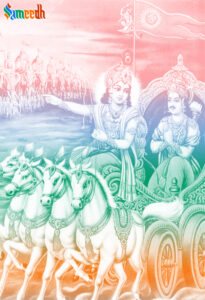In the Hindu epic, the Mahabharata, Lord Krushna imparts the teachings of the Bhagavad Gita to Prince Arjuna during the Kurukshetra War. There are several reasons for why Lord Krushna chose Arjuna to receive these teachings:

The Bhagavad Gita, through its conversation between Lord Krushna and Arjuna, addresses fundamental questions about life, duty, morality, and spirituality.
- Arjuna’s Dilemma: At the beginning of the Kurukshetra War, Arjuna is overcome with moral and emotional dilemmas. He is deeply conflicted about fighting against his own relatives, friends, and teachers who are on the opposing side of the war. This moral and emotional crisis made him a receptive and earnest student for the guidance offered by Lord Krushna.
- Arjuna’s Character: Arjuna is a virtuous and righteous warrior. He is known for his devotion, discipline, and moral integrity. Lord Krushna recognized these qualities in Arjuna, making him a suitable recipient for the profound spiritual teachings of the Bhagavad Gita.
- Role in the Epic: Arjuna is one of the central characters in the Mahabharata. His role in the epic as one of the Pandava princes and a key warrior in the Kurukshetra War makes him a pivotal figure in the narrative. By instructing Arjuna, Lord Krushna’s teachings in the Bhagavad Gita become an integral part of the epic’s story.
- Teachings for All: While Lord Krushna imparted the teachings of the Bhagavad Gita to Arjuna in the context of the battlefield, the Gita’s wisdom is universal and applicable to all individuals facing the challenges and dilemmas of life. Arjuna’s situation served as a backdrop to convey these universal teachings to humanity.
- Divine Plan: In Hindu theology, it is believed that Lord Krushna is an incarnation of Lord Vishnu, and his actions are part of a divine plan. By choosing Arjuna as the recipient of the Bhagavad Gita’s teachings, it is seen as a part of this divine plan to guide humanity and deliver spiritual knowledge at a crucial moment in history.
Bhagavad Geeta provides profound insights into the nature of the self and the path to spiritual realization, making it a timeless and revered scripture in Hindu philosophy and a source of inspiration for people of various spiritual traditions.